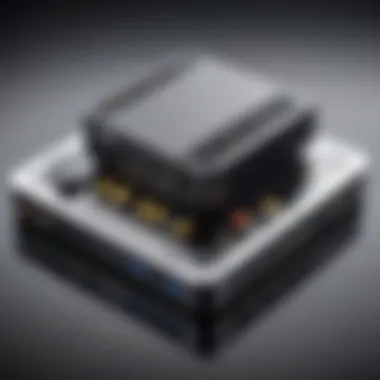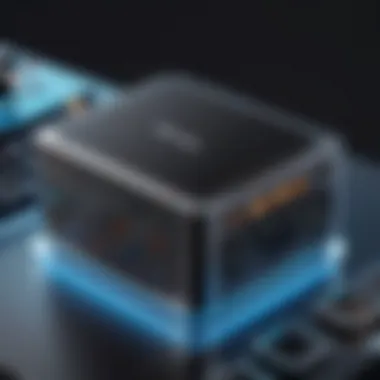Exploring the Mini PC Game Console: In-Depth Analysis


Intro
The advent of the mini PC game console represents a shifting paradigm in gaming technology. These compact devices converge the functionalities of traditional gaming consoles and personal computers, making them appealing to a wide audience. This exploration aims to understand their development, technical nuances, and market implications, focusing on how they cater to the evolving tastes of gamers and tech enthusiasts.
A mini PC game console often boasts an array of features that enhance the user experience. With the ability to run games with high graphics and multitask, they serve both casual gamers and serious users who desire flexibility. Intricate specifications and performance metrics are vital in comparing these consoles against established gaming platforms. Additionally, analyzing the trends shaping their growth reveals important insights into the future of gaming.
As we delve further into this subject, we will cover several key points. We'll discuss the defining characteristics and technical aspects of mini PC game consoles. Following this, performance analysis through benchmark testing and real-world scenarios will be highlighted. This comprehensive overview aims to provide a well-rounded understanding, addressing both the advantages and limitations inherent in these devices.
Prologue to Mini PC Game Consoles
Mini PC game consoles represent a significant shift in how we understand and interact with gaming technology. As gaming continues to evolve, the need for compact, powerful systems has grown. Mini PC game consoles provide this unique intersection of performance and portability, appealing to a wide array of consumers from casual gamers to hardcore enthusiasts.
This section is crucial. It establishes the foundation for understanding mini PC game consoles by delving into their specific characteristics, historical context, and relevance in today's gaming landscape. These systems exemplify innovation, merging traditional gaming experiences with modern technology and user expectations.
Defining Mini PC Game Consoles
Mini PC game consoles are compact computing devices that deliver gaming capabilities similar to traditional consoles. They typically run on standard operating systems, such as Windows or Linux, and can support a wide range of games, from indie titles to major AAA releases. Unlike traditional consoles, which often restrict users to a proprietary ecosystem, mini PC game consoles offer greater flexibility.
Key features include:
- Compact Size: Designed to save space, making them suitable for small environments.
- Versatility: Capable of performing multiple tasks beyond gaming, such as media streaming and productivity.
- Upgrade Potential: Many models allow users to enhance performance by replacing components, which is less common in conventional consoles.
Overall, the flexibility and performance benefits make them appealing options for today’s gamer.
Historical Context of Gaming Consoles
To understand the rise of mini PC game consoles, it’s helpful to examine the history of gaming devices. The evolution began in the late 1970s with basic home consoles. Systems like the Atari 2600 introduced the concept of home gaming. Then, the late 1980s and early 1990s brought advances in graphics with the introduction of 16-bit and 32-bit consoles.
Throughout the years, technology continued to develop. The launch of Sony's PlayStation and Microsoft's Xbox dramatically shifted the gaming landscape, establishing home consoles as dominant forces. However, as the technology advanced, new preferences emerged. Gamers began seeking devices that not only played games but also offered more functionality and portability, leading to the introduction of mini PC game consoles.
By viewing the slow yet steady transformation of gaming devices, we observe a pattern of increased consumer demand for multi-functional, compact systems that can adapt to modern lifestyles. This context is essential for understanding current market dynamics and the future viability of mini PC game consoles.
Evolution of the Mini PC Game Console
The evolution of mini PC game consoles represents a significant shift within the gaming landscape. This transformation not only showcases advancements in technology but also highlights changing consumer behavior and market dynamics. The mini PC game consoles have become essential tools for gamers looking for a balance between performance and portability. As such, understanding this evolution is vital for grasping the current state of the gaming industry.
Technological Advancements Over Time
Mini PC game consoles have benefitted from numerous technological advancements over the years. Initially, these devices were basic and lacked the capabilities of traditional consoles or gaming PCs. However, a series of innovations has led to the development of more compact hardware. Improvements in processing power, graphics capabilities, and energy efficiency have been at the forefront of this evolution.
- Processing Power: Modern mini PCs utilize Intel or AMD processors that can handle demanding games.
- Graphics: Dedicated GPUs from manufacturers like NVIDIA enhance visual performance, allowing for higher resolution and frame rates.
- Storage Solutions: With the integration of solid-state drives (SSDs), loading times are significantly reduced compared to traditional hard disk drives.
These technological enhancements enable mini PC game consoles to compete effectively with larger consoles, making them much more appealing to consumers.


Market Demand and Consumer Preferences
As technology continues to advance, market demand for mini PC game consoles has also evolved. Gamers today seek flexibility in their gaming setups. Factors influencing consumer preferences include:
- Portability: More people want systems that can be easily transported without losing power.
- Customization: Many users appreciate the ability to upgrade hardware components like RAM or storage.
- Software Diversity: Consumers enjoy access to a wide range of games, spanning multiple platforms.
The growing trend for digital downloads and the emergence of platforms like Steam have also played vital roles in consumer choices. Gamers are now looking for systems that can run a vast library of titles without being limited to console-exclusive games. This aligns with a broader push towards integrating gaming with everyday computing needs, revealing changing perceptions of gaming devices.
"The mini PC game console market reflects a convergence of technology and user demands, responding to a fast-changing gaming culture that values efficiency and versatility."
The mini PC game console, once a niche segment, now holds a prominent place in the gaming ecosystem. This shift underscores the importance of innovation in catering to a discerning audience that expects more from their gaming experiences.
Key Features of Mini PC Game Consoles
As the landscape of gaming evolves, mini PC game consoles have carved out a notable position. Understanding their key features is essential for appreciating their role in the current market. These devices blend traditional gaming experiences with PC-level performance in a compact design. Each feature contributes to their growing popularity, and gamers should consider these elements to make informed purchasing decisions.
Performance Specifications
Performance is a primary consideration for any gaming console. Mini PC game consoles typically offer impressive specifications, comparable to full-sized PCs. Many models come equipped with powerful processors, such as the Intel Core i7 or AMD Ryzen series. The RAM can range from 8GB to 32GB, allowing for multitasking and efficient game performance.
Additionally, storage options have expanded. HDDs have been standard, but SSDs are becoming more common, enhancing load times significantly. Graphics capabilities also play a crucial role; many mini PCs feature integrated graphics or dedicated GPUs like NVIDIA GeForce GTX or RTX series. Gamers looking for a seamless experience should assess these specifications closely.
In summary, the performance specifications of mini PC game consoles serve as a benchmark for determining their suitability for various gaming needs.
Design Considerations
The design of mini PC game consoles is another critical factor. These consoles prioritize both aesthetics and functionality. Typically, they are smaller than traditional consoles, making them easy to fit into diverse environments. Their compact nature allows for placement in small entertainment centers or on desks without compromising space.
Many mini consoles are designed with ventilation systems to prevent overheating during extensive gaming sessions. Connectivity options are also vital; USB ports, HDMI outputs, and Ethernet jacks are standard. Moreover, the choice of materials and build quality can impact durability, especially in portable models.
Ultimately, the design plays a significant role in user satisfaction. A thoughtful design enhances usability and integrates seamlessly into existing setups.
Software Compatibility
Another defining feature of mini PC game consoles is their software compatibility. Unlike traditional consoles, which have exclusive game titles, mini PCs support a vast range of software. Most run on Windows, allowing access to platforms like Steam, Epic Games Store, and GOG.
This flexibility means that many indie games, emulators, and legacy titles are readily available to the user. Gamers can choose from genres that may not even be available on conventional consoles. Additionally, the ability to run software for streaming and productivity can transform a gaming console into a multipurpose device.
For those keen on modding, the PC ecosystem provides avenues for customization not found in traditional consoles. This feature attracts gamers who wish to tailor their experience to specific preferences.
Advantages of Mini PC Game Consoles
The mini PC game console emerges as a notable asset within the gaming landscape. This segment will articulate its core advantages. These advantages define the practical relevance of mini PC game consoles in a market dominated by more traditional gaming devices.
Portability and Space Efficiency


One of the significant benefits of mini PC game consoles is their portability. Being compact in size, these devices facilitate easy transport. Their design enables gamers to enjoy a wide array of games anywhere, be it at home or on the go. Many users appreciate the ability to fit these consoles in smaller spaces, which aligns with the contemporary trend towards minimalism in home entertainment setups.
Moreover, their lightweight nature allows for convenient stowage, making it simple to move between locations or pack for travel. This is particularly advantageous for users who may wish to set up gaming stations in different environments like friends' houses or gaming events.
"Portability of mini PC game consoles means gamers do not have to sacrifice gaming experience for mobility."
Customization and Upgradability
Another compelling advantage lies in the customization and upgradability options of mini PC game consoles. Unlike some traditional consoles, which often have fixed specifications, mini PCs empower users to upgrade hardware components such as RAM or storage. This flexibility extends the lifespan of the console and ensures that it can adapt to evolving gaming requirements.
Gamers can tailor their machine based on specific preferences, allowing for an optimized gaming experience that suits individual needs, be it enhanced graphics or faster load times. This capability to customize results in a more personal gaming experience, ultimately leading to user satisfaction.
In summary, the advantages of mini PC game consoles—encompassing portability and customization—render them a compelling choice for gamers today. They address crucial consumer preferences, paving the way for a new class of gaming devices that blend functionality with performance in unique ways.
Challenges Faced by Mini PC Game Consoles
The challenges posed by mini PC game consoles are significant to understanding their market position. Unlike traditional consoles, which benefit from long-established brand loyalty and large-scale production, mini PCs exist in a unique space. Their versatility and design create opportunities but also complications. These challenges must be explored to fully comprehend the potential and limitations that mini PC game consoles present to consumers and developers alike.
Performance Limitations
Mini PC game consoles, while compact and adaptable, often struggle with performance compared to their larger counterparts. The limited physical space restricts cooling solutions, which can lead to overheating during extended gaming sessions. This thermal throttling diminishes gameplay smoothness and can affect overall user experience.
Moreover, the internal hardware usually consists of lower-end components, tailored towards energy efficiency rather than outright performance. CPUs like the Intel Core i3 or low-end AMD Ryzen models are common. These processors may handle light gaming but find it challenging to run graphics-intensive titles smoothly. This disparity in performance can dissuade serious gamers from considering mini PCs for their gaming needs.
In addition, mini PCs might lack sufficient RAM and GPU capabilities needed for high-resolution gaming. While many models can support 1080p resolution, resolutions like 4K can be beyond reach for some systems. Given that many gamers are now expecting 4K and beyond, this limitation stands as a considerable drawback.
Pricing and Market Competition
The pricing of mini PC game consoles raises another barrier for their broader acceptance. When comparing them with traditional consoles like the PlayStation 5 or Xbox Series X, the price range is strikingly similar or sometimes even higher. This makes it difficult for mini PCs to find a niche in a market that values cost efficiency.
Furthermore, competition is fierce. Major players dominate the market, and gamers often align with brands they know. The allure of flagship devices, cutting-edge exclusive titles, and vast online ecosystems overshadow smaller or lesser-known mini PC models. This lack of recognition can lead to a perception that mini PCs are less capable, even if they offer unique features.
In addition, potential buyers are faced with a question of value. They must determine whether the functions offered by a mini PC justify a higher price or less performance. The decision-making process becomes even more intricate given the availability of powerful gaming laptops, which sometimes serve as an alternative, positioning mini PC consoles in a tight spot.
"The mini PC game console landscape must navigate performance valleys and pricing peaks to reach a successful spot in a competitive gaming market."
Ultimately, overcoming these performance limitations and pricing challenges will be crucial for the future of mini PC game consoles. Addressing these matters head-on can help manufacturers fine-tune their strategies and better position themselves within the ever-evolving landscape of gaming.
Comparative Analysis with Conventional Consoles
A comparative analysis between mini PC game consoles and conventional gaming consoles is crucial in understanding their respective roles and market potential. The differences between these systems are not merely technical; they also reflect broader consumer habits and preferences. Analyzing these differences helps delineate the unique advantages offered by mini PCs while also highlighting their limitations in certain aspects of gaming.
Performance Metrics Comparison
When comparing performance metrics, several dimensions come into play. Mini PC game consoles generally incorporate powerful hardware similar to that found in typical desktop PCs. This allows them to run demanding games with better graphics and processing capabilities. Additionally, the flexibility to upgrade components such as RAM and graphics cards enhances the longevity and performance of mini PCs.


Conversely, conventional consoles like Sony's PlayStation or Microsoft's Xbox are designed with optimized specifications geared directly toward gaming. This approach allows them to achieve high performance with standardized hardware, ensuring that games run smoothly across all units.
In essence, while performance metrics can favor mini PCs in raw specifications, conventional consoles often outperform in terms of game optimization. This optimized setup provides a seamless experience for users, particularly those less inclined to tinker with hardware.
Game Library Accessibility
The game library accessibility is another pivotal aspect in the comparative analysis. Mini PC game consoles benefit from a much wider range of available games. They can access libraries from platforms like Steam, Epic Games Store, and numerous indie developers. This extensive range enables players to choose games across various genres and styles.
Meanwhile, conventional consoles are limited to their own ecosystems. Platforms like PlayStation and Xbox have exclusive titles that cannot be played on other systems. This exclusivity can be a double-edged sword; while it may enhance the appeal of the console itself, it can restrict access to potential players who prefer certain games exclusive to mini PC systems.
In summary, the comparative analysis reveals critical insights regarding performance and accessibility. Both types of consoles cater to different segments of gamers based on their needs and preferences. Understanding these distinctions can help consumers make informed decisions based on what they value most in their gaming experiences.
The Future of Mini PC Game Consoles
The future of mini PC game consoles holds significant relevance in the gaming landscape. These devices are at the intersection of technology and entertainment, responding rapidly to trends and shifts in consumer demand. As gaming continues to evolve, mini PCs stand poised to capture a critical market niche.
Advancements in hardware technology are transforming the capabilities of mini PC game consoles. They are becoming more powerful, with better processors and graphics. This evolution enables richer gaming experiences. Gamers are increasingly attracted to the idea of having a small yet capable unit that can fit in any space. They can play a wide range of games, including high-end ones, without the bulk of traditional consoles.
Emerging Technologies Impacting the Market
Several emerging technologies are expected to influence the mini PC game console market.
- Hardware Innovations: Companies are consistently pushing the boundaries of efficient hardware. Integrated graphics cards and compact high-performance chipsets are enhancing processing speed while keeping the size small. Devices like the Intel NUC and ASUS ROG Zephyrus showcase this innovation.
- Cloud Gaming Services: Platforms such as NVIDIA GeForce Now and Google Stadia are reshaping how games are consumed. Players no longer need powerful hardware to run demanding games. Instead, they can stream directly, making mini PCs a viable solution for accessing next-gen games without substantial local storage or processing power.
- Virtual Reality and Augmented Reality: As VR and AR gain traction, mini PCs are adapting to support these technologies. Their portability combined with VR headsets leads to a versatile gaming setup that caters to modern gamers.
This adaptation ensures that mini PC game consoles remain relevant. They will likely incorporate these advancements into their designs and functionalities.
Trends in Consumer Behavior
Understanding consumer behavior is vital for forecasting the future of mini PC game consoles.
- Demand for Versatility: Consumers increasingly seek devices that serve multiple functions. Mini PCs are not only game consoles but can also be used for productivity, media consumption, and even as home theater systems. This versatility ensures they appeal to a broader audience.
- Shift Toward Indie Games and Retro Titles: There is a significant rise in the popularity of indie games and remastered classics. Mini PCs can easily accommodate these smaller game titles, allowing players to enjoy a rich library without needing extensive resources.
- Sustainability Concerns: As awareness of environmental impact grows, consumers prefer energy-efficient devices. Mini PC game consoles typically consume less power than traditional consoles, aligning with this growing consumer trend.
Epilogue
The exploration of mini PC game consoles culminates in an appreciation of their unique position within the gaming ecosystem. These devices offer a hybrid approach, combining PC capabilities with the convenience typically associated with traditional game consoles. Mini PC game consoles have emerged as a noteworthy response to the market's demand for flexibility, performance, and space-saving designs. They create an intriguing alternative for gamers who want to retain the rich experience of PC gaming without the typical bulkiness of traditional setups.
Recap of Key Insights
In this article, we have surveyed various aspects of mini PC game consoles.
- Definition and Evolution: We defined mini PC game consoles and traced their historical context, highlighting key technological advancements that shaped their development.
- Performance and Compatibility: Performance specifications were analyzed along with software compatibility features, revealing how these console types accommodate a diverse range of games.
- Market Dynamics: The relationship between consumer preferences and market demand was examined, showing how trends influence design and functionalities.
- Advantages and Challenges: We also discussed the portability and upgradability benefits while addressing the challenges such as performance limitations and pricing competition.
This comprehensive overview illustrates why mini PC game consoles stand out. They invite both seasoned gamers and new entrants to explore gaming in new ways.
Final Thoughts on the Mini PC Game Console Paradigm
Looking forward, the mini PC game console paradigm is expected to grow in relevance. The integration of emerging technologies, such as cloud gaming and artificial intelligence, can enhance user experience and expand game libraries. Additionally, as consumer behavior trends lean towards more customized gaming experiences, mini PC consoles will likely adapt to such shifts.
"The future of gaming is multifaceted, where hybrid devices will continue to carve their niche alongside traditional formats."
In summary, mini PC game consoles are not merely a passing trend; they represent a thoughtful convergence of portability, performance, and adaptability in an ever-evolving landscape. The insights gathered here are crucial for understanding the potential that these devices hold in enriching the gaming experience moving forward.



